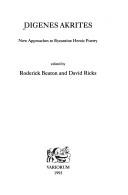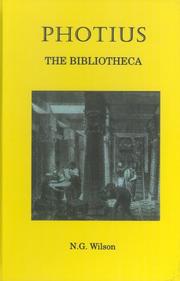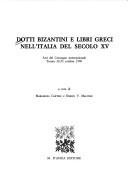
ISBN: 0860783952 9780860783954 Year: 1993 Volume: 2 Publisher: Aldershot: Variorum,
Abstract | Keywords | Export | Availability | Bookmark
 Loading...
Loading...Choose an application
- Reference Manager
- EndNote
- RefWorks (Direct export to RefWorks)
Epic poetry, Byzantine --- Digenis Akritas (Legendary character) in literature. --- History and criticism. --- 877.3 --- -Digenis Akritas (Legendary character) in literature --- Byzantine epic poetry --- Byzantine poetry --- Byzantijnse literatuur --- History and criticism --- 877.3 Byzantijnse literatuur --- Digenis Akritas (Legendary character) in literature --- Digenis Akritas (Byzantine poem) --- Digenēs Akritas (Byzantine poem) --- Digenēs Akritēs (Byzantine poem) --- Exploits de Basile Digénis Acritas (Byzantine poem) --- Vasileios Digenēs Akritas (Byzantine poem) --- Epic poetry, Byzantine - History and criticism.

ISBN: 0715626124 Year: 1994 Publisher: London Gerald Duckworth and Co
Abstract | Keywords | Export | Availability | Bookmark
 Loading...
Loading...Choose an application
- Reference Manager
- EndNote
- RefWorks (Direct export to RefWorks)
Christian literature, Early --- Greek literature --- History and criticism. --- 094 <01> --- 875 <01> --- 877.3 --- 091 PHOTIUS CONSTANTINOPOLITANUS --- Oude en merkwaardige drukken. Kostbare en zeldzame boeken. Preciosa en rariora--Bibliografieën. Catalogi --- Griekse literatuur--Bibliografieën. Catalogi --- Byzantijnse literatuur --- Handschriftenkunde. Handschriftencatalogi--PHOTIUS CONSTANTINOPOLITANUS --- 091 PHOTIUS CONSTANTINOPOLITANUS Handschriftenkunde. Handschriftencatalogi--PHOTIUS CONSTANTINOPOLITANUS --- 877.3 Byzantijnse literatuur --- 875 <01> Griekse literatuur--Bibliografieën. Catalogi --- 094 <01> Oude en merkwaardige drukken. Kostbare en zeldzame boeken. Preciosa en rariora--Bibliografieën. Catalogi --- History and criticism --- Photius I
Book
ISBN: 9788897351290 8897351298 Year: 2019 Volume: 156 Publisher: Roma: Institutum patristicum Augustinianum,
Abstract | Keywords | Export | Availability | Bookmark
 Loading...
Loading...Choose an application
- Reference Manager
- EndNote
- RefWorks (Direct export to RefWorks)
877.3 --- 276:232 --- 276:232 Patrologie. Patristiek-:-Jezus Christus. Christologie: dogmatisch. De Verbo incarnato --- 276:232 Patrologie. Patristique-:-Jesus Christ. Christologie dogmatique. De verbo incarnato --- Patrologie. Patristiek-:-Jezus Christus. Christologie: dogmatisch. De Verbo incarnato --- Patrologie. Patristique-:-Jesus Christ. Christologie dogmatique. De verbo incarnato --- 877.3 Byzantijnse literatuur --- Byzantijnse literatuur --- John, --- Pseudo-Dionysius, --- Jesus Christ --- History of doctrines --- John, - Bishop of Scythopolis, - active 6th century. --- Pseudo-Dionysius, - the Areopagite. --- Jesus Christ - History of doctrines - Early church, ca. 30-600.

ISBN: 8870920860 Year: 1992 Volume: 6 Publisher: Napoli : M. D'Auria,
Abstract | Keywords | Export | Availability | Bookmark
 Loading...
Loading...Choose an application
- Reference Manager
- EndNote
- RefWorks (Direct export to RefWorks)
Greek philology --- Humanism --- Humanisme --- Study and teaching --- History --- Congresses --- Histoire --- Congrès --- Italy --- Italie --- Civilization --- Byzantine influences --- Intellectual life --- Civilisation --- Influence byzantine --- Vie intellectuelle --- 09 <063> --- 877.3 --- 873.4 <45> --- 091 =75 --- 093 =75 --- 002 --- Handschriften. Oude en merkwaardige drukken. Curiosa--Congressen --- Byzantijnse literatuur --- Humanistisch Latijnse literatuur--Italië --- Handschriftenkunde. Handschriftencatalogi--Grieks --- Incunabelen. Incunabelkunde--Grieks --- General The book --- Conferences - Meetings --- 093 =75 Incunabelen. Incunabelkunde--Grieks --- 091 =75 Handschriftenkunde. Handschriftencatalogi--Grieks --- 873.4 <45> Humanistisch Latijnse literatuur--Italië --- 877.3 Byzantijnse literatuur --- 09 <063> Handschriften. Oude en merkwaardige drukken. Curiosa--Congressen --- Congrès --- Congresses.
Book
ISBN: 9781472489357 1472489357 9781315269443 0367181142 1315269449 1351979094 9781351979078 1351979086 Year: 2017 Publisher: Abingdon (Oxon): Routledge,
Abstract | Keywords | Export | Availability | Bookmark
 Loading...
Loading...Choose an application
- Reference Manager
- EndNote
- RefWorks (Direct export to RefWorks)
Dialogues and Debates from Late Antiquity to Late Byzantium offers the first overall discussion of the literary and philosophical dialogue tradition in Greek from imperial Rome to the end of the Byzantine empire and beyond. Sixteen case studies combine theoretical approaches with in-depth analysis and include comparisons with the neighbouring Syriac, Georgian, Armenian and Latin traditions. Following an introduction and a discussion of Plutarch as a writer of dialogues, other chapters consider the Erostrophus, a philosophical dialogue in Syriac, John Chrysostom’s On Priesthood, issues of literariness and complexity in the Greek Adversus Iudaeos dialogues, the Trophies of Damascus, Maximus Confessor’s Liber Asceticus and the middle Byzantine apocryphal revelation dialogues. The volume demonstrates a new frequency in middle and late Byzantium of rhetorical, theological and literary dialogues, concomitant with the increasing rhetoricisation of Byzantine literature, and argues for a move towards new and exciting experiments. Individual chapters examine the Platonising and anti-Latin dialogues written in the context of Anselm of Havelberg’s visits to Constantinople, the theological dialogue by Soterichos Panteugenos, the dialogues of Niketas ‘of Maroneia’ and the literary dialogues by Theodore Prodromos, all from the twelfth century. The final chapters explore dialogues from the empire’s Georgian periphery and discuss late Byzantine philosophical, satirical and verse dialogues by Nikephoros Gregoras, Manuel II Palaiologos and George Scholarios, with special attention to issues of form, dramatisation and performance. "Dialogues and Debates from Late Antiquity to Late Byzantium offers the first overall discussion of the literary and philosophical dialogue tradition in Greek from imperial Rome to the end of the Byzantine empire and beyond. Sixteen case studies combine theoretical approaches with in-depth analysis and include comparisons with the neighbouring Syriac, Georgian, Armenian, and Latin traditions. Following an introduction and a discussion of Plutarch as a writer of dialogues, other chapters consider the Erostrophus, a philosophical dialogue in Syriac, John Chrysostom's On Priesthood, issues of literariness and complexity in the Greek Adversus Iudaeos dialogues, the Trophies of Damascus, Maximus Confessor's Liber asceticus, and the middle Byzantine apocryphal revelation dialogues. The volume demonstrates a new frequency in middle and late Byzantium of rhetorical, theological and literary dialogues, concomitant with the increasing rhetoricisation of Byzantine literature, and argues for a move towards new and exciting experiments"--Provided by publisher. "This is the first book to deal with the writing of literary and philosophical dialogues in Greek from the Roman empire to the end of Byzantium and beyond. Arranged in chronological order, 16 case studies combining theoretical approaches and in-depth analysis introduce a wide array of such dialogues, including consideration of the neighbouring Syriac, Georgian, and Armenian, as well as Latin traditions"--Provided by publisher.
Dialogues, Greek --- Debates and debating --- History and criticism --- History --- Rome --- Byzantine Empire --- Intellectual life --- History and criticism. --- History. --- Intellectual life. --- 877.3 --- Argumentation --- Speaking --- Elocution --- Forensics (Public speaking) --- Public speaking --- Rhetoric --- Discussion --- Oratory --- Greek dialogues --- Greek literature --- 877.3 Byzantijnse literatuur --- Byzantijnse literatuur --- Byzantium (Empire) --- Vizantii︠a︡ --- Bajo Imperio --- Bizancjum --- Byzantinē Autokratoria --- Vyzantinon Kratos --- Vyzantinē Autokratoria --- Impero bizantino --- Bizantia --- Rim --- Roman Empire --- Roman Republic (510-30 B.C.) --- Romi (Empire) --- Rome (Italy) --- Dialogues, Greek - History and criticism --- Debates and debating - Rome - History --- Debates and debating - Byzantine Empire - History --- Rome - Intellectual life --- Byzantine Empire - Intellectual life
Book
ISBN: 9782503551067 2503551068 Year: 2013 Volume: 16 5 Publisher: Turnhout: Brepols,
Abstract | Keywords | Export | Availability | Bookmark
 Loading...
Loading...Choose an application
- Reference Manager
- EndNote
- RefWorks (Direct export to RefWorks)
"Discovered by the French scholar, Marcel Richard, on one of his photographic expeditions to the monastic libraries of Mount Athos, the 'Thesaurus' was entrusted to a young scholar, Joseph Munitiz, who prepared the editio princeps for his doctoral thesis, defended at the Sorbonne in 1976. The work was shown to have been composed by a little-known spiritual author, thought to have been active in the fourteenth century, but placed, thanks to a passing reference in his Treasury, in the middle of the thirteenth century. This semi-encyclopaedic work was intended to provide an overview of the sort of knowledge considered essential for a young prince, as one chapter is an exhortation to a future emperor. Thus it contains a summary of the Old Testament, with curious reflections (e.g. on female wickedness and the ingenuity of Solomon), and chapters on dogmatic questions: the divinity of Christ; the value of Holy Scripture; the sacraments, icons, the Theotokos, and the key role of the Ecumenical Councils. A large part is made up of moral exhortations attributed partly to Amphilochios and backed by pious stories. There are also florilegia, so popular in Byzantine spiritual writings, focused around the eucharist, the priesthood, sexual morality and confession. At the end, some questions-and-answers (another popular Byzantine genre) deal with items of general knowledge (ranging from theology, through astronomy, to alms-giving). In general, the work opens a window into the mind of the ordinary believer in mediaeval Constantinople."--Back cover.
Theology [Christian ] --- Vie chrétienne --- Auteurs orthodoxes --- Theognostos, --- Theognōstos, --- Theology --- Christian life --- Théologie --- Vie chrétienne --- Early works to 1800. --- Orthodox Eastern authors --- Early works to 1800 --- Ouvrages avant 1800 --- Orthodox Eastern Church --- Doctrines --- #GBIB: jesuitica --- Christians --- Discipleship --- Religious life --- Theology, Practical --- Christianity --- Theognostus, --- Théognoste, --- Θεόγνωστος, --- 877.3 <08> --- 248 <093> --- 248 <093> Spiritualite. Ascese. Mystique. Theologie ascetique et mystique. Devotion--Historische bronnen --- 248 <093> Spiritualiteit. Ascese. Mystiek. Vroomheid--Historische bronnen --- Spiritualite. Ascese. Mystique. Theologie ascetique et mystique. Devotion--Historische bronnen --- Spiritualiteit. Ascese. Mystiek. Vroomheid--Historische bronnen --- 877.3 <08> Byzantijnse literatuur--Verzamelwerken. Reeksen --- Byzantijnse literatuur--Verzamelwerken. Reeksen
Book
ISBN: 9783777219028 3777219029 Year: 2019 Publisher: Stuttgart : Anton Hiersemann,
Abstract | Keywords | Export | Availability | Bookmark
 Loading...
Loading...Choose an application
- Reference Manager
- EndNote
- RefWorks (Direct export to RefWorks)
"Charmante, aber unbeherrschte Kronprätendenten, mädchenhafte fünfzigjährige Kaiserinnen, goldene Musikautomaten am Hof, eine ruinöse Schlacht bei Mantzikert (die Vorwand für den ersten Kreuzzug wurde) - der mittelbyzantinische Chronist Konstantinos Manasses schrieb keine trockenen Berichte, sondern Geschichten aus der Geschichte. Seine Chronik beginnt zwar mit der Schöpfung der Welt und reicht beinahe bis in die Lebenszeit des Autors, doch handelt es sich um mehr als eine Aneinanderreihung von historischen Fakten. Manasses war vielmehr daran interessiert, seiner Auftraggeberin Eirene, der Schwägerin des Kaisers Manuel I. Komnenos, auch von Mord und Totschlag, Liebe, Eifersucht und Neid zu erzählen. Die deutsche Erstübersetzung richtet sich nicht nur an die byzantinistische Fachwelt, sondern auch an ein Publikum von Historikern und Literaturwissenschaftlern, das entdecken möchte, wie es einem byzantinischen Autor des 12. Jahrhunderts gelang, von der Geschichte in abwechslungsreichen und spannenden Episoden zu erzählen."--
World history --- Byzantine Empire --- History --- Greek poetry --- Cosmology, Medieval --- 877.3 --- 949.5.03 --- 949.5 <093> --- 949.5.03 Geschiedenis van Byzantium: Isaac I - Latijnse verovering--(1057-1204) --- Geschiedenis van Byzantium: Isaac I - Latijnse verovering--(1057-1204) --- 877.3 Byzantijnse literatuur --- Byzantijnse literatuur --- Universal history --- Greek literature --- 949.5 <093> Geschiedenis van Byzantium en Griekenland--Historische bronnen --- Geschiedenis van Byzantium en Griekenland--Historische bronnen --- Medieval cosmology --- Manasses, Constantine, --- Byzantium (Empire) --- Vizantii︠a︡ --- Bajo Imperio --- Bizancjum --- Byzantinē Autokratoria --- Vyzantinon Kratos --- Vyzantinē Autokratoria --- Impero bizantino --- Bizantia --- Civilization --- Civilization. --- Cosmology, Medieval. --- Greek poetry. --- World history. --- Synopsis historikē (Manasses, Constantine). --- Byzantine Empire.
Book
ISBN: 0813219426 9780813219424 9780813201238 0813201233 9780813228112 Year: 2011 Volume: 123 Publisher: Washington, D.C. : Catholic University of America Press,
Abstract | Keywords | Export | Availability | Bookmark
 Loading...
Loading...Choose an application
- Reference Manager
- EndNote
- RefWorks (Direct export to RefWorks)
In 611 Andrew of Caesarea applied his superior exegetical skills to the challenging Book of Revelation and concluded that the end was not near, in spite of the crises that the empire was facing
Bible. --- Abūghālimsīs --- Apocalipse (Book of the New Testament) --- Apocalisse (Book of the New Testament) --- Apocalypse (Book of the New Testament) --- Apocalypse of John --- Apocalypse of St. John --- Apocalypsis Johannis --- Apocalypsis S. Johannis --- Apokalypse (Book of the New Testament) --- Apokalypsin --- Book of Revelation --- Johannes-Apokalypse --- Johannesapokalypse --- Johannesoffenbarung --- Offenbarung des Johannes --- Revelation (Book of the New Testament) --- Revelation of St. John --- Revelation of St. John the Divine --- Revelation to John --- Ruʼyā (Book of the New Testament) --- Sifr al-Ruʼyā --- Yohan kyesirok --- 877.3 --- 877.3 Byzantijnse literatuur --- Byzantijnse literatuur --- Apokalipsa św. Jana --- Apokalipsa świętego Jana
Book
ISBN: 2251662480 2251672486 9791036538148 9782251662480 Year: 2019 Volume: 248 Publisher: Liège : Presses universitaires de Liège,
Abstract | Keywords | Export | Availability | Bookmark
 Loading...
Loading...Choose an application
- Reference Manager
- EndNote
- RefWorks (Direct export to RefWorks)
Bibliotheekwezen --- Bibliothèques --- Biographies --- Histoire ecclésiastique --- Kerkgeschiedenis --- Letterkunde --- Levensbeschrijvingen --- Littérature --- Photios, Heilige --- Photios, Saint --- Greek literature --- Christian literature, Early --- Byzantine literature --- Littérature grecque --- Littérature chrétienne primitive --- Littérature byzantine --- History and criticism --- Histoire et critique --- Photius --- History and criticism. --- 877.3 --- 091 PHOTIUS CONSTANTINOPOLITANUS --- 091 =75 --- 094 <01> --- -Christian literature, Early --- -Early Christian literature --- Patristic literature --- Balkan literature --- Classical literature --- Classical philology --- Greek philology --- Byzantijnse literatuur --- Handschriftenkunde. Handschriftencatalogi--PHOTIUS CONSTANTINOPOLITANUS --- Handschriftenkunde. Handschriftencatalogi--Grieks --- Oude en merkwaardige drukken. Kostbare en zeldzame boeken. Preciosa en rariora--Bibliografieën. Catalogi --- Photius I, Saint, Patriarch of Constantinople --- 094 <01> Oude en merkwaardige drukken. Kostbare en zeldzame boeken. Preciosa en rariora--Bibliografieën. Catalogi --- 091 =75 Handschriftenkunde. Handschriftencatalogi--Grieks --- 091 PHOTIUS CONSTANTINOPOLITANUS Handschriftenkunde. Handschriftencatalogi--PHOTIUS CONSTANTINOPOLITANUS --- 877.3 Byzantijnse literatuur --- -Byzantijnse literatuur --- -877.3 Byzantijnse literatuur --- Early Christian literature --- Littérature grecque --- Littérature chrétienne primitive --- Littérature byzantine --- Photius I --- Photius Constantinopolitanus --- Littérature grecque. --- Littérature chrétienne primitive. --- Traductions latines --- Greek literature - History and criticism --- Christian literature, Early - History and criticism --- Photios --- Photius - I, - Saint, Patriarch of Constantinople, - approximately 820-approximately 891 - Bibliotheca --- biographie --- bibliothèque --- historiographie littéraire --- index --- tradition --- Photius I, Saint, Patriarch of Constantinople, approximately 820-approximately 891
Book
ISBN: 9782503552378 2503552374 2503552633 Year: 2014 Volume: 9 Publisher: Turnhout: Brepols,
Abstract | Keywords | Export | Availability | Bookmark
 Loading...
Loading...Choose an application
- Reference Manager
- EndNote
- RefWorks (Direct export to RefWorks)
The learned literary language of Byzantium is subjected to new and ground-breaking analysis in this volume. Built on a highly traditional educational system, the language of Byzantine literature was for the most part written in an idiom deeply influenced by ancient Greek texts and grammatical handbooks. The resulting overall archaizing impression of Byzantine Greek is largely why the language of learned literature – as compared with the relatively well researched vernacular literature – has seldom been taken seriously as an object of linguistic study. This volume combines the expertise of linguists and scholars of Byzantine literature to challenge the assumption that learned mediaeval Greek is merely the weary continuation of ancient Greek or, worse still, a poor imitation of it, while proposing that it needs to be treated as a literary idiom in its own right. The contribution that texts of this kind can offer to sub-fields of Greek historical linguistics is explored using specific examples. Sociolinguistic theory provides a particularly useful framework for a more accurate analysis of the relationship between the vernacular and classicizing varieties of Greek literary language. In addition, the impact of the educational system on the production of texts is examined. In another chapter it is shown that a number of far-reaching assumptions, which originated in the 15th century, about accentuation and the middle voice still tend to colour our understanding of Byzantine, as well as ancient, Greek. Other chapters focusing on particles, the dative and the synthetic perfect reveal that Byzantine authors, while of course influenced by the living spoken language, used their classical linguistic heritage in a creative and innovative way.
Byzantijnse literatuur --- Byzantine literature --- Greek literature [Byzantine ] --- Greek literature [Medieval and late ] --- Griekse literatuur [Byzantijnse ] --- Griekse literatuur [Middeleeuwse ] --- Littérature byzantine --- Littérature grecque médiévale --- Medieval Greek literature --- Middeleeuws-Griekse literatuur --- Greek language, Medieval and late --- Literacy --- Literatur. --- Sprachstil. --- History and criticism --- Grammar, Historical --- Social aspects --- Byzantine Empire --- Byzantinisches Reich. --- Intellectual life --- Literary form --- Grec byzantin --- English literature.

 Search
Search Feedback
Feedback About UniCat
About UniCat  Help
Help News
News